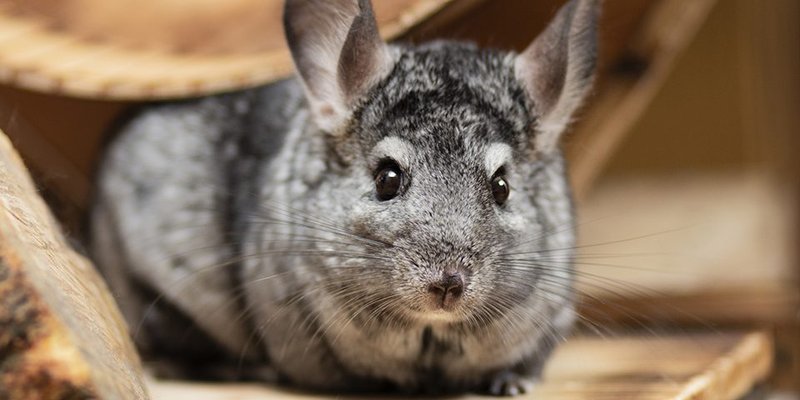
Caring for a chinchilla involves understanding their unique needs and potential health concerns. While these charming creatures are known for their resilience, they can develop specific issues that, if left unchecked, can lead to serious complications. So, let’s dive into some common health concerns in standard grey chinchillas and how you can prevent them!
Understanding the Anatomy of Chinchillas
Chinchillas are fascinating creatures with a unique anatomy that plays a big role in their health. They have very sensitive digestive systems, large ears for superior hearing, and delicate skin that’s susceptible to moisture and temperature changes. You might see them happily hopping around, but underneath that playful exterior is a complex body that can be quite vulnerable.
Dental health is particularly crucial for chinchillas. Their teeth grow continuously, just like a hamster’s, and they need to gnaw on hard foods or chew toys to keep them trimmed. If they don’t wear down their teeth properly, it can lead to painful overgrowth, which might require veterinary intervention. Imagine trying to eat with a painful tooth—yikes!
Another critical area is their respiratory system. Chinchillas can be sensitive to high humidity and temperature extremes, which might lead to respiratory issues. For instance, if the air is too damp, they can develop pneumonia. So, if you’ve got a chinchilla, it’s essential to keep their environment dry and cool, just like a naturally chilly mountain breeze.
Common Health Issues in Chinchillas
Let’s review some common health concerns that chinchillas face:
- Dental Problems: As mentioned earlier, overgrown teeth can cause a lot of pain and lead to eating difficulties.
- Gastrointestinal Issues: Chinchillas can suffer from bloating or diarrhea if their diet is not balanced.
- Respiratory Infections: These can occur due to poor living conditions or exposure to drafts.
- Heat Stroke: Chinchillas can overheat quickly, which can be fatal if not addressed.
- Skin Issues: Skin irritations can arise from damp conditions or poor hygiene.
Each of these conditions can be distressing for your chinchilla. Honestly, nobody wants to see their pet in discomfort. On top of that, many of these health issues can stem from improper care or environmental factors, highlighting the importance of being proactive.
Preventive Care: A Key to a Long and Healthy Life
Prevention is always better than cure! Here are some essential steps to help prevent common health concerns in standard grey chinchillas.
1. Balanced Diet
Providing a proper diet is the foundation of good health. A chinchilla’s diet should consist mainly of high-fiber hay, like timothy or orchard grass, which helps maintain healthy teeth and a stable digestive system. You can supplement with small amounts of dry pellets, but be cautious with treats. Too many can upset their delicate digestive balance.
Make sure to avoid fresh fruits and veggies as these can lead to diarrhea. You wouldn’t serve a five-course meal of rich foods to a friend, right? The same logic applies to your chinchilla!
2. Proper Housing
Creating a comfortable habitat is essential. Chinchillas thrive in cool, dry environments. Use good-quality bedding that absorbs moisture and keeps the living area dry, like aspen shavings or paper-based bedding. Avoid cedar and pine, as the oils can be harmful.
Also, ensure that their cage is spacious and well-ventilated, allowing for plenty of room to play and explore. Think of it like giving them a cozy apartment with all the amenities!
3. Regular Health Checks
It’s essential to keep an eye on your chinchilla’s health through regular checks. Look for any changes in behavior, like decreased activity or not eating. Weighing them weekly can help catch weight loss early, which is often a sign of underlying health issues. If you notice anything unusual, don’t hesitate to consult a vet familiar with small animals.
You might be wondering, “How often should I take them to the vet?” Ideally, an annual check-up is a good practice, just to ensure everything is healthy and happy.
Recognizing Symptoms of Illness
Recognizing symptoms early can make all the difference. Here are some signs to watch out for:
- Changes in Eating Habits: If your chinchilla is eating less or not at all, it could be a red flag.
- Isolation: If your usually playful chinchilla seems withdrawn, that’s not their normal behavior.
- Changes in Coat: A dull or rough coat can indicate poor health or nutrition.
- Excessive Grooming: This might suggest skin issues or parasites.
If you notice any symptoms like these, it’s time to make an appointment with your vet. You know your pet best, and trust your instincts!
Common Misconceptions About Chinchilla Health
There are plenty of myths floating around about chinchilla care that can lead to unnecessary stress. One common misconception is that chinchillas can’t get sick. While they may seem resilient, they are still susceptible to various health issues.
Another myth is that chinchillas don’t need regular vet visits. Just like we need check-ups, chinchillas should see a vet at least once a year. It’s all part of responsible pet ownership.
Caring for a standard grey chinchilla involves more than just providing food and water; it’s about understanding their unique health needs. From recognizing signs of illness to maintaining a balanced diet and proper living conditions, your attentiveness will ensure your furry friend has a long, happy life.
So, keep those ears perked up and those whiskers twitching! With a little love, awareness, and preventive care, you can enjoy many playful moments with your precious chinchilla. Remember, the bond you create through your attention and care is what truly makes pet ownership rewarding. Happy chinchilla parenting!
